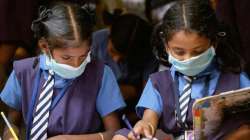Tamil Nadu sets apart 7.5% preferential quota for govt school students in admission to professional courses
The quota bill, introduced in the assembly by Chief Minister M K Stalin, applies to the students who have studied in state run schools from sixth to 12th standard and gives effect to the recommendation of the commission under chief justice of High Court, Delhi, justice D Murugesan

The Tamil Nadu government on Thursday set apart 7.5 percent reservation on “preferential basis” to the state government school students for their admissions to engineering, agriculture, veterinary, law and other professional degree courses offered in government, aided and private institutions in the State.
The quota bill, introduced in the assembly by Chief Minister M K Stalin, applies to the students who have studied in state run schools from sixth to 12th standard and gives effect to the recommendation of the commission under chief justice of High Court, Delhi, justice D Murugesan.
Piloting the bill seeking to provide 7. 5 percent reservation to government school students on preferential basis in admission to professional courses, similar to the 7. 5 percent horizontal reservation for state government students in medical college admission brought out in the past, the CM said the government school students were unable to secure admission in professional courses, as they could not compete with their counterparts from private schools, owing to the socio-economic disparity.
“Over the years, fewer students from the state government schools got admitted to the professional courses. During 2020 – 21, a mere 0. 83 percent government students were admitted to the Anna University, 6. 31 percent in government institutions, 0. 44 percent in aided engineering colleges while 3 percent got admission in Veterinary course,” he said. Only 3. 7 percent government school students got admission in fisheries, 4. 89 percent in agriculture and less than 1 percent in the National Law University in Tiruchirappalli, he added.
The opposition AIADMK had welcomed the Tamil Nadu Admission to Undergraduate Professional Courses on a preferential basis to students of Government Schools Act, 2021, at the introductory stage.
The justice Murugesan commission, formed to assess and analyse reasons for less intake of government school students in engineering and other professional courses, in it findings said the students being in a disadvantageous position, require more facilities to pursue their school education and preferential treatment in joining various professional courses. Considering the socio-economic condition, disadvantage suffered and the past enrolment of government school students, the commission recommended that not less than 10 percent of seats in engineering, agriculture, veterinary, fisheries, law and other professional courses may be set apart to provide preference in admission to them, the commission had said.
“It is evident from the commission’s report that there exists de facto inequalities between the government school students and the private school students. The government after careful examination of the recommendation of the commission has decided to take affirmative action so as to bring about real equality between the students who studied in government schools and in private schools, be setting apart certain percentage of seats on preferential basis, to the students who studied from sixth to twelfth standard in the state government schools in the admission to engineering and other professional degree courses,” the statement of objects and reasons of the Bill, said.
The bill was later unanimously passed by the House.
